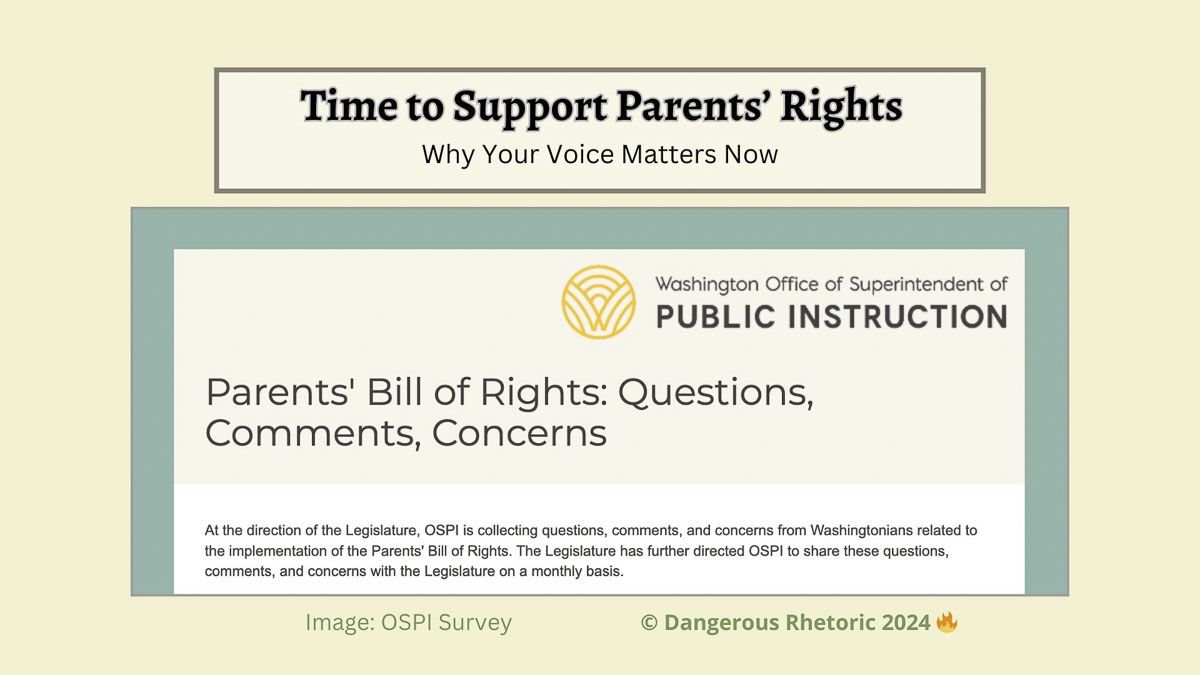
Nancy Churchill says parents should seize this moment to weigh in on how the state implements I-2081
Nancy Churchill
Dangerous Rhetoric
The Parents’ Bill of Rights (I-2081) is reshaping Washington’s approach to parental involvement in education, emphasizing transparency and a parent’s right to access their child’s information within the school system. However, this bill has sparked debates between safeguarding student privacy and empowering parental rights. Parents should seize this moment to weigh in on how the state implements I-2081. The Office of Superintendent of Public Instruction (OSPI) has created a very short survey for you to provide important feedback regarding how the law will be enforced in the future.
Understanding the Parents’ Bill of Rights

I-2081, also known as the Parents’ Bill of Rights, was passed to affirm parents’ authority to know about their children’s educational and health experiences within Washington’s public schools. The legislation gives parents the right to access student records, receive notifications about their children’s academic and social developments, and opt into or out of certain educational activities, like those focused on sexual orientation or gender identity education which may conflict with the moral or religious values in the family home. Proponents argue that it ensures transparency and keeps parents informed of decisions that may impact their children’s well-being.
The OSPI has acknowledged the rights outlined in the bill but has stressed that these rights must coexist with protections for student privacy, particularly around issues like gender identity, mental health, and sensitive personal information. In it’s statement, OSPI affirms its commitment to both “student privacy and safety,” maintaining that certain information may remain confidential to protect the student’s welfare.
Balancing parental rights and student safety
One of the primary points of contention with I-2081 is the balance between a parent’s right to know and a student’s right to privacy, particularly for older students navigating personal issues. For instance, OSPI has indicated that disclosing sensitive information about students — such as counseling records related to gender identity — could inadvertently put some students at risk, particularly if they lack a safe, supportive environment at home.
This official position from OSPI raises concerns for parents who feel they should have full access to ALL of their children’s school records, including all health and counseling records. Many argue that transparency would foster a more supportive environment at home and allow them to guide their children effectively. Schools should never keep secrets from parents or guardians. However, OSPI’s position is that educators have a responsibility to protect students’ mental health, especially when revealing such information might have adverse consequences at home.
Why parental feedback is essential
The OSPI has opened the door to parental feedback on I-2081’s implementation, and this is where Washington parents can make a significant impact. Policymakers and educational leaders need to hear directly from families about how this law affects them on a practical, day-to-day level. Parents are uniquely qualified to provide insights into how the law may help — or hinder — their ability to support their children.
While the OSPI emphasizes student privacy, parents can express concerns about how overprotective interpretations may limit transparency, which undermines the purpose of I-2081.
For example, if schools restrict parents from accessing information they deem crucial for understanding their children’s academic and social development, it will create mistrust between families and schools. Restricting access also prevents parents from effectively helping their children to navigate the difficult and emotional changes that accompany the teen transformation to adulthood. Before children make permanent and irreversible heath choices, they must have the support and guidance of their family. Getting parents’ perspectives can help OSPI find solutions that support students’ health and safety without undermining parental involvement and oversight.
How parents can effectively voice their concerns
To make a meaningful impact, parents should reach out to OSPI with a respectful, solution-oriented approach. Here are some guidelines to help parents frame their survey response letters effectively:
1. Be Clear and Specific: Start by mentioning specific parts of I-2081 that concern you. This could be the law’s stance on accessing student records, the need for transparency, or trusting the parents to have their children’s best interests in mind.
2. Share Personal Stories: If applicable, share a personal experience to illustrate why access to information is vital for your child’s well-being. Real-life examples provide a compelling case for OSPI officials to re-consider their opposition the full transparency.
3. Suggest Practical Solutions: Instead of only highlighting problems, propose reasonable solutions. For example, if you believe there’s too much restriction around mental health information, suggest a procedure for allowing parental access under specific conditions.
4. Emphasize Respect and Cooperation: Acknowledge the importance of student safety and the OSPI’s role in protecting it, but stress that parents also need transparency to effectively support their child’s education and development.
By framing concerns thoughtfully and constructively, parents can present a strong case for implementing the law as written and passed by the legislature.
The importance of parental involvement in education
Parents are the backbone of their children’s education, often knowing more about each child’s specific needs than anyone else. Ensuring that parents have the necessary access to educational and personal information helps them make informed decisions and support their children’s learning journey. While schools play a pivotal role in student development, they are just one part of a larger support system that includes families.
The OSPI’s mission should align with creating a collaborative environment where both parents and educators work together in the best interest of students. This means fostering an atmosphere of trust, where parents don’t feel left in the dark, and students feel supported both at home and at school. Engaging parents as active participants in their children’s education is essential to nurturing an informed, responsible, and capable future generation.
Taking action for lasting impact
Now is the time for parents across Washington to take a stand for their rights and responsibilities in their children’s education. By writing to OSPI, parents can ensure their voices are heard, advocating for a balanced implementation of I-2081 that respects family values while safeguarding student safety. Through collective action, Washington parents can influence the policy outcomes that shape their children’s educational experiences.
Conclusion: A Call to Action
The Parent’s Bill of Rights represents a turning point for parental involvement in Washington’s education system. However, the law’s impact will depend heavily on how it is implemented. Parents have a unique opportunity to shape this process by sharing their views with OSPI.
Doing so can foster a system where transparency and privacy are carefully balanced, serving both the educational needs of students and the rightful role of parents. Let’s make sure Washington’s educational policies reflect the voice of families and the principles of parental involvement that this law was intended to protect. Please take a moment to write a paragraph supporting parents rights, and submit it to the Superintendent using this form.
Your voice could make a big difference in the lives of many students and their families.
Nancy Churchill is a writer and educator in rural eastern Washington State, and the state committeewoman for the Ferry County Republican Party. She may be reached at DangerousRhetoric@pm.me. The opinions expressed in Dangerous Rhetoric are her own. Dangerous Rhetoric is available on thinkspot, Rumble and Substack.
Also read:
- Opinion: What the 2025 legislature tells us about why Washington’s government keeps failingTodd Myers of the Washington Policy Center argues that Washington’s government fails because it resists humility, experimentation, and accountability in its policymaking.
- Town hall: Republicans say they are the ones fighting for the working classFour Republican legislators gathered in Battle Ground for a town hall to address rising taxes, education concerns, and their push to support Washington’s working class.
- Pooneh Gray Files for Vancouver City CouncilPooneh Gray has filed to run for Position #1 on the Vancouver City Council, emphasizing public safety, homelessness solutions, and community justice.
- Opinion: Legislative session ‘was full of ups and downs and many learning experiences’Rep. John Ley reflects on the 2025 legislative session, highlighting local funding victories and warning of major tax increases passed by the majority.
- Title IX fight escalates as WA districts push back on gender identity policiesSchool districts in Washington are filing civil rights complaints against the state over gender identity policies, prompting a federal Title IX investigation.











There is no such thing a minors privacy. A child has no medical privacy from their parents.
I was in grade and HS in 40’s and 50’s. Coucelors where only involved for students acting out in classes etc. If you got in any trouble in school, you were in bigger trouble at home! I think that has largely changed and unfortunate. Medical things didn’t come up unless a student wa sick, etc and parents were called. No secrets.
Please excuse my misspellings above. I need to review where my fingers went on the lap top! 🙂